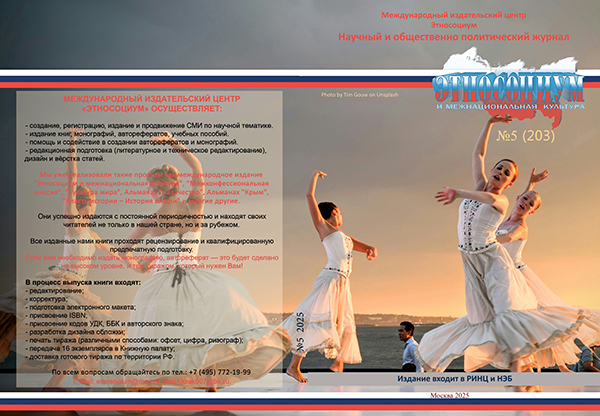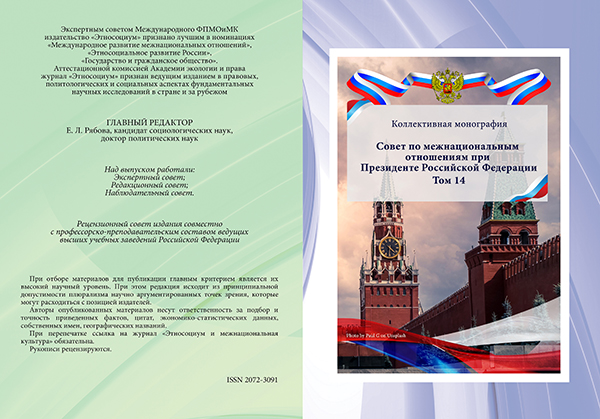

Content
|
CURRENT PROBLEMS OF MODERN SOCIETY
|
|
|
Kaparov A.A. Sociocultural and value factors in the state policy of Russia as an object of research
|
9
|
|
Pavlov N.R., Slabov E.A. The fight against terrorism in the information security system
|
20
|
|
REGIONAL RESEARCH
|
|
|
Denisov A.E. The political aspect of teaching the subject “Fundamentals of Russian Statehood”: opportunities and prospects for small nations (on the example of the Kryashen community)
|
31
|
|
INTERNATIONAL RELATIONS
|
|
|
Ryabova E.L., Ternovaya L.O. Models of expansion of state territory: American and Russian experience
|
40
|
|
Garifzianov R.R. The Islamic factor in modern Kazakhstan
|
49
|
|
Abulizijiang Shawuti, Shan Kang Promoting the construction of the "Large-Scale ideological and political work course" through the praise assembly for national unity and progress: value guidelines, content focus, and practical paths
|
63
|
|
Turin E.A., Savinova E.N., Mustafin D.O. The Scottish style in politics: specific and universal manifestations. Part 1
|
82
|
|
TianYu Li, Pengcheng Li, Yanling Mei The path recommendation model of Cultivating College Students' prosocial behavior in Ideological and Political Education
|
96
|
|
Wu Bo The internal logic and external challenges of the 75-year evolution of the new type major-country relationship between China and Russia
|
113
|
|
Zhou Tianyun, Wu Huixin, Zuo Ruichao The quality of systemic thinking in Xi Jinping's cultural idea
|
127
|
|
Garifzianov R.R. Evolution of transformations of military doctrines of the Republic of Kazakhstan on the background of the "afghan events"
|
138
|
|
Abstracts
|
152
|
|
Authors
|
165
|
|
Requirements to materials submitted to the international publishing house "Etnosocium"
|
169
|
The article examines socio-cultural and value factors as key determinants of the formation and implementation of public policy in modern Russia. The article analyzes the essence and structure of these factors, identifies their influence on political decision-making and determines the prospects for introducing a value-oriented approach into public administration practice. Particular attention is paid to the problem of balance between traditional Russian spiritual and moral values and the challenges of globalization and digitalization. The study shows that effective integration of socio-cultural factors into public policy helps to strengthen national identity, increase social cohesion and ensure the cultural sovereignty of Russia.
Key words: socio-cultural factors, value orientations, public policy, national identity, cultural sovereignty, digitalization, globalization, traditional values.
The article discusses the protection of information security from terrorist threats, and modern terrorism, which has become one of the global problems of our time and requires not only a forceful, but also a political solution. The causes and conditions of terrorism are analyzed. The purpose of the study is to disclose the system of countering terrorist threats in the field of information security, the information component of terrorism and information support for counter-terrorism activities, as well as legislation in the field of information security.
Conclusions. As a result of the conducted research, the author demonstrates the capabilities of states to protect information security from terrorist threats and formulates proposals on promising areas for countering terrorist threats in the information sphere. The author concludes that for the practical activities of bodies ensuring the protection of information security from terrorist threats, it is necessary to improve the activities of state bodies in the field of countering and preventing terrorism.
Key words: countering terrorist threats, information sphere, terrorist attacks, information security system, countermeasures.
The article examines the peculiarities of teaching the subject “Fundamentals of Russian Statehood." Special attention is paid to the relevance of this discipline in our time. Now there are attempts to “cancel” our history and level it down to a “random and neutral” space. With this approach, there is a great danger of the disintegration of the population of our country along ethnic and confessional lines. The author highlights the possibilities of this subject for the preservation of the cultural and ethnic heritage of small nations, using the example of the Kryashen community. The article notes broad prospects, from the revival of interest in his small homeland to thoughts about how he himself can help his country in the profession he entered to study.
Key words: identity, immersiveness, history, kryashens, worldview, nation, education, foundations of Russian statehood, perspective, ethnicity.
The article examines examples of Russian and American examples of expansion of state territories. It is shown that despite the difference in the models of the policy of annexation of new lands, one can find common features that contrast with the models of colonial policy of Western European powers. These models are also close in their understanding of the geopolitical significance of territory as a factor of global influence.
Key words: geopolitics, state, territory, expansion, purchase, annexation.
In this article, the author goes into the history of the origin, formation and adaptation of Islam to the historical and geographical specificies of Kazakhstan. In conclusion, the author finds that, in combination with the historical background, it is safe to say that there was a special "Kazakh Islam", since Islam did not become the dominant factor in the ethnic consolidation of the Kazakh people, but was organically integrated into the traditional worldview system, coexisting with pre-Islamic beliefs and cults.
Key words: Kazakhstan, Islam, Afghanistan, Central Asian security, Russia, religious extremism.
The National Unity and Progress Commendation Conference, as a symbolic event with both political leadership and ideological education, fits with and achieves the construction of the ‘Great Ideology and Politics Course’ in a functional sense, and is related to the construction of the ‘Great Ideology and Politics Course's’ national discourse and narrative system, the tangible and tangible impact of the ‘Great Ideology and Politics Course’ on the Chinese people. It is about constructing an ethnic discourse and narrative system for the ‘Great Ideology and Politics Course’, effectively forging a strong sense of community among the Chinese nation, and continuing the ethnic chapter of Chinese modernisation in the new era and new journey. The National Unity and Progress Commendation Conference is the reality of the construction of the ‘Great Ideology and Politics Course’, and its implied ‘spatial orientation’, ‘organisational orientation’ and ‘talent orientation’ are the benchmarks for the construction of the ‘Great Ideology and Politics Course’. Its implicit ‘spatial orientation’, ‘organisational orientation’ and ‘talent orientation’ are in line with the requirements of building a ‘big classroom’, a ‘big platform’ and a ‘big teacher’. In the new era, we can create a strong atmosphere of ‘big ideological and political class’ by giving play to typical examples, create diversified carriers of ‘big ideological and political class’ by making good use of rituals and ceremonies, and polish the characteristic ‘big ideological and political class’ brand by innovating publicity methods. ‘The brand of ‘Big Ideological and Political Class’ is being promoted.
Key words: National unity and progress, Political leadership, Ideological and educational work, Ideological and political work in the classroom, National curriculum system, China's modernization process.
This article raises the theoretical question of the validity of the use of the concept of "Scottish political style" in scientific discourse, and also examines various aspects of the real manifestation of the Scottish style in the political and managerial practice of Scotland. The authors chose the scientific ethnopolitological understanding of the specific and universal manifestations inherent in different stages of the political cycle in Scotland as their research goal. The theoretical and methodological basis of the article are: comparative ethnopolitical analysis; system analysis; socio-cultural approach; methods of combining sociological and institutional paradigms. The results obtained: 1. The concept of the Scottish style can be attributed to a distinctive way of developing and implementing policy in Scotland. 2. The essence of the Scottish style is revealed in the fact that it relatively calmly correlates with the competence of the Scottish authorities and the differences in the policy outcomes of Edinburgh and London. Conclusion: The example of Scotland shows that if politics is a mixture of intentional and unintended outcomes, then an emphasis on a particular political style can exaggerate the ability of a particular government to do something specific. At the same time, the subjects of the political cycle are simultaneously subject to universal processes associated with limited knowledge and coordination capabilities, as well as with a high level of duality, discretion and complexity inherent in political processes, which, in turn, undermines centralized control, giving rise to ethnopolitical variations.
Key words: Scotland, political process, public administration, Scottish style, political cycle, Scottish government.
The self-enhancement needs of college students should not only improve their own positive qualities and personal value, but also realize the integration and adaptation between themselves and society by paying attention to the interests of others, so as to enhance the sense of social value. This kind of self enhancement needs to promote prosocial behavior through two paths: initiative and sociality. The formation of prosocial behavior is conducive to the healthy development of college students and the formation of a harmonious social relationship. Based on this, this paper designs the path recommendation model of Ideological and political education to cultivate college students' prosocial behavior. Starting from the reality of Ideological and political education, under the guidance of socialist core values, it seeks effective countermeasures to improve the current situation of cultivation, promotes college students' prosocial behavior, and recommends the behavior path by selecting the interest characteristics of students' behavior.
Key words: ideological and political education, prosocial behavior, path recommendation.
Based on a systematic review of the evolution of China-Russia relations over the past 75 years (1949-2024), this article summarizes that the relationship between the two countries has undergone a transformation from an ideological led military alliance, strategic confrontation, and collaborative exploration to institutional cooperation. Its internal logic is reflected in the establishment of the principle of sovereign equality, peaceful resolution of historical legacy issues, and the formation of a composite interdependent network. In the face of changes in the international environment, China and Russia have effectively responded to the US containment strategy through the "partnership rather than alliance" model. In the structural game between the Eurasian geoeconomic layout and the Indo-Pacific strategy, a cooperation framework covering multiple fields such as energy, digital governance, and cross-border infrastructure has been constructed. The article emphasizes that the new type of major-country relationship between China and Russia has surpassed the bilateral scope and become a key force in shaping a multipolar international order. Its non-confrontational cooperation paradigm provides empirical samples for avoiding the dilemma of traditional alliances.
Key words: China-Russia relations, International order transformation, Strategic collaborative partnership, Geopolitical game, Eurasian geoeconomic layout.
Xi Jinping's cultural thought is a systematic system formed and continuously enriched by the Communist Party of China (CPC) in the practice of building a socialist culture with Chinese characteristics in the new era. It contains such distinctive qualities of systematic thinking as integrity, hierarchy, and openness and scientifically meets the ideological and cultural needs of modern society.
Key words: Xi Jinping's cultural thought, system, systemic thinking.
This article examines the military doctrines of the Republic of Kazakhstan, each of which was shaped under the influence of specific geopolitical conditions both globally and within the region. Particular emphasis is placed on the impact of developments in Afghanistan, notably the threats and challenges arising from the Afghan crisis, including terrorism, Islamic extremism, narcotics production and trafficking, and the influx of Afghan refugees.
Key words: military doctrine, Kazakhstan, Afghanistan, Central Asian security, Taliban, CSTO, hybrid threats.